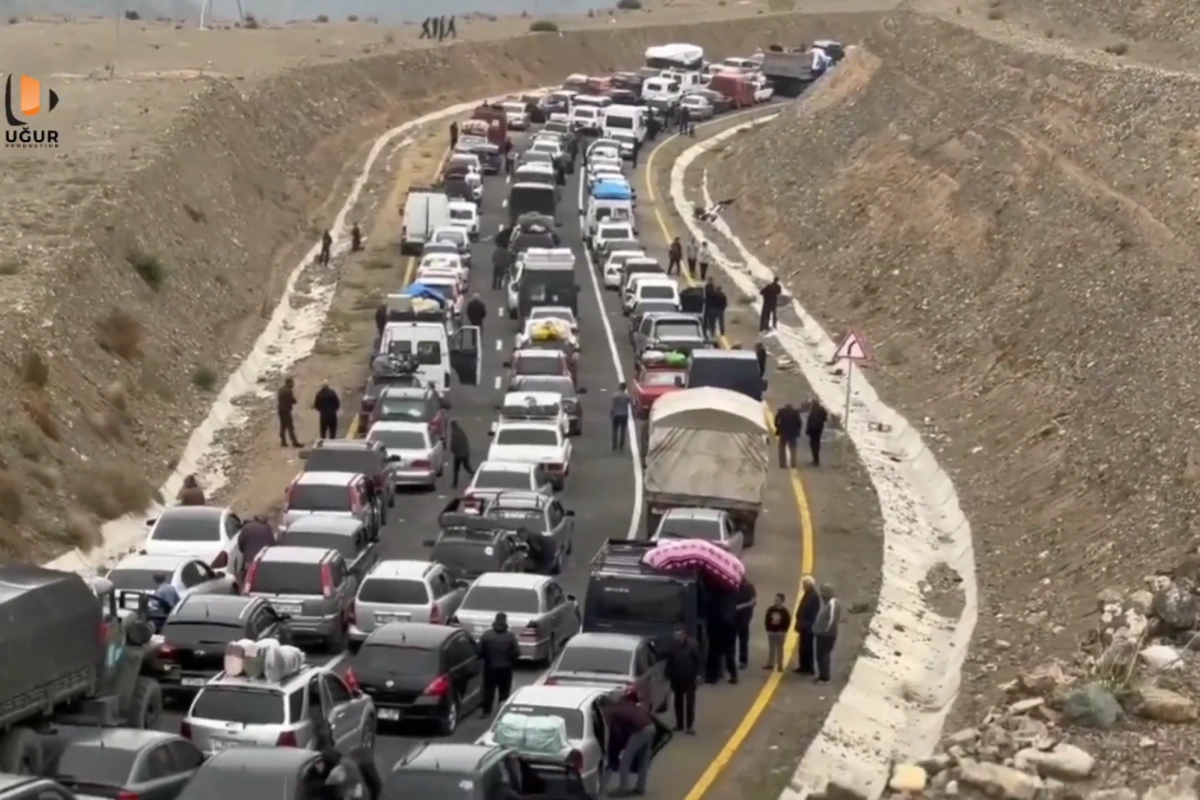
Ethnic Armenians are leaving Karabakh, citing “ethnic cleansing.” However, Azerbaijan categorically denies such allegations and remains committed to the peaceful reintegration of the region.
Image: YouTube screengrab
Following Azerbaijan’s “counter-terrorism” measures, which lasted just under 24 hours from 19-20 September, talks occurred between Azerbaijan and representatives from Karabakh’s ethnic Armenian population. Despite this, since Sunday afternoon, up to 42,500 ethnic Armenians have left Karabakh, citing fears of “ethnic cleansing.” Armenian PM Nikol Pashinyan stated that if there are no mechanisms to protect the Karabakh Armenians from ethnic cleansing, it is likely that they will see leaving their homes as the only way to protect their lives and identity, further stating that the responsibility for this falls on Azerbaijan and the Russian peace-keeping contingent stationed in the area. Since then, various examples have been put forward in accounts from international media sources of violence and hostilities from Azerbaijan towards ethnic Armenians, which Azerbaijan states are categorically untrue.
Additionally, Azerbaijan maintains that its goal remains “peaceful reintegration” and that bringing comfort, peace, and stability to Karabakh is of primary importance. On 20 September, Azerbaijan’s President Ilham Aliyev stated, “The Armenian population in Karabakh can now breathe easy. They are our citizens. We have no hostility towards the Armenian people.” However, according to the Financial Times, the Armenians it spoke to would rather leave than live under their “historic enemy.” This appears to suggest that the mass exodus of the ethnic Armenian population is based primarily on personal choice due to animosity rather than forced upon them by violence and persecution.
Furthermore, Presidential Advisor Hikmat Hajiev asserted that Azerbaijan is not forcing anyone to leave and that it was the “personal and individual decision of the residents.” This was seemingly confirmed by a series of

Interestingly, a few interviewees also recalled living among Azerbaijanis before Armenia seized the region in 1994 as a peaceful time. One interviewee recalled the names of his Azerbaijani friends, and others described the period as “friendly,” “honest,” and “fair.” These accounts mirror the

For its part, since the exodus began, Azerbaijan has continued to send aid to the region. On 26 September, SOCAR (the State Oil Company of the Republic of Azerbaijan) sent 64 tons of fuel to Khankendi via the Agdam road, with another vehicle dispatched today. Additionally, Azerbaijan sent 40 tons of flour, sanitary products, and bedding, as well as medical supplies to those injured in a fuel depot explosion near Khankendi on 25 September. While the explosion’s cause is unknown, Azerbaijan’s Ministry of Emergency has stated that it has dispatched 53 vehicles containing the equipment needed to build a field hospital.
It appears that while some narratives from the media show Azerbaijan as an aggressor, forcing people to leave their homes and committing acts of violence against them, the situation on the ground is more nuanced. Azerbaijan insists that the “counter-terrorism” measure enacted last week solely targeted military formations and infrastructure, avoiding civilians in the hostilities and held talks with representatives of the ethnic Armenians in Karabakh to find a peaceful solution to disarmament and reintegration. Additionally, Russia’s Foreign Minister has countered Pashinyan’s account of the possibility of ethnic cleansing as resulting from Azerbaijani and Russian peace-keepers actions, claiming that Pashinyan should have worked with Moscow and Baku towards peace, partially echoing a sentiment by former Armenian First Deputy Minister of Foreign Affairs Gerard Libaridian on 12 September. Even now, amid a max exodus of ethnic Armenians, Azerbaijan continues to publicly appeal for peaceful reintegration and is providing humanitarian aid in various forms.
Additionally, Azerbaijan’s Ministry of Foreign Affairs has responded to the UN High Commissioner for Human Rights Volker Türk’s statement that called on Azerbaijan to protect the rights of the ethnic Armenian population. A spokesperson for the MFA reiterated that although Armenia’s illegal 30-year occupation of Karabakh involved massacres and atrocities against Azerbaijanis, Azerbaijan has always been committed to safeguarding the rights of ethnic minorities within Azerbaijan, including Armenians. Similarly, President Aliyev recently spoke to U.S. Secretary of State Anthony Blinken regarding the current situation. Aliyev confirmed that Azerbaijan is working to ensure the rights of Armenians living in Karabakh within the framework of its international obligations, is cooperating with the ICRC to guarantee the delivery of humanitarian aid, and that Azerbaijan is willing to organize a visit of the UN Resident Liaison Office accredited in Azerbaijan to Karabakh.
In the aftermath of recent events in Karabakh, a complex and delicate situation has emerged, characterized by the voluntary departure of ethnic Armenians amid concerns of “ethnic cleansing.” Azerbaijan’s various statements on prioritizing the well-being of the Armenian population, coupled with its provision of humanitarian aid, present encouraging signs. However, the region’s historical complexities and deep-seated animosities underscore the need for diplomatic efforts and cooperation among all parties to ensure lasting peace that enables all inhabitants to coexist harmoniously.
Share on social media